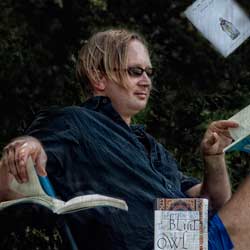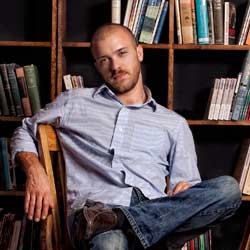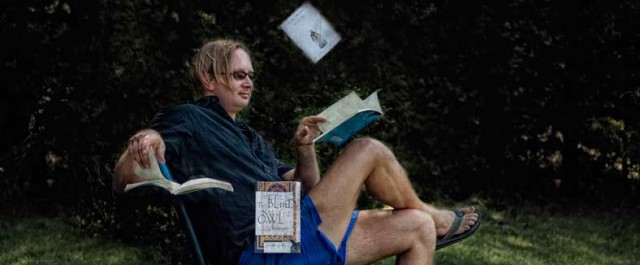Interview by Eric Wallace
In early 2007, associate professor and official overseer of Lynchburg College’s department of graduate studies in English, Casey Clabough, made what he has categorized as a bizarre and high risk gamble. Fascinated—perhaps even obsessed!—with the migration of his ancestors (a troupe of hardy Germanic pioneers who, swearing off the domesticity of Virginia’s tidewater region, cut out for the Smoky Mountains in the late 1700s), Clabough decided to follow in their footsteps, to seek out—if there was such a thing to be found—the “spiritual resonances” of their 500-plus-mile trek through the ancient, mythic hills of Appalachia.
What follows is a discussion inspired by The Warrior’s Path, the hybridized travelogue x memoir x historical exegesis Clabough penned about that adventure.
I entered the world in Richmond, VA but my family moved to Appomattox when I was very young and I grew up there, which is largely what my recent memoir, SCHOOLED, is about. My mother was a research scientist—one of the few women in the field then—at MCV, but she wanted me raised away from there. Incidentally, I think my best piece of prose writing to date—“The Skeleton Woman”—is about she and I. However, the dominant cultural influence in my family came from my father’s people, who had lived in the Smoky Mountains for nearly two centuries. They were displaced to a Virginia farm when the park was created and so I grew up surrounded by Appalachian culture in piedmont Virginia, close to the Blue Ridge but still piedmont southern. To sum up, the country South of Appomattox didn’t seem alien to most of what my Smokies kin talked about, although there were some major differences. Obviously, I have a farm now in Appomattox, but the mountains still call to me and I’ve spent a lot of time in them—I feel most at home among mountains. As far as belonging, I don’t think I really belong anywhere, so I try to make the best of wherever I happen to find myself. I’m one of those people who doesn’t romanticize places since life remains life wherever one goes.
In an interview with Oxford American, you described yourself as an obscure writer whose work would probably be more-or-less forgotten after you died. In that same segment, you stated you had something of an epiphany that led you to accepting/adapting this mentality. Could you elaborate?
Well, I don’t know that there’s anything very profound about it, although I do know writers who maintain that is their position but still network and operate their asses off at conferences and residencies [laughs]. I think the body of someone’s work tells the truth of the matter. Take my scholarly books, for example. I would have written them all about big, dominant canonical writers and used the theoretical flavors of the day if I had wanted to try to become a big-shot scholar. Right now I’m working on the October essay for the Hollins Critic. It’s entitled “The Best Appalachian Writer You Likely Never Heard Tell Of.” So, yes, I’m attracted to good writers who just do or did their thing. I’ve also found they’re the most useful writers to talk to since it’s all about the writing and topics like literary politics and gossip never seem to come up.
As a guy making a living in academia, how do you navigate that differential between scholar and artist? Is there any distinction for you between those two?
I think it harkens back to the last question. I am what I am and do what I do. In terms of myself, I don’t think about genre divisions or that there’s even a schism between teaching and writing—to me it’s all the same. But it does seem to surprise some people when I suddenly generate a biography or a novel or a creative writing textbook or a book of poems in another language. It’s like they’re thinking, “Wait, you’re supposed to be just a critic. Get back over there” [Laughs]. I mean, I’m not even just a writer; I have many other interests, passions, and avenues of expression, If various people choose to take the writings of Casey Clabough and the person behind that particular name as the same thing, then that’s their problem.
You’re a rather prolific writer. How do you move from the realms of inchoate idea, conceptualization, work-in-progress, to realized manuscript? What does that process look like for you?
At this point in my career it’s pretty much defined by the next publishing deadline: that’s the project I need to work on. I have to be very organized, too, due to my current lifestyle. I mean, winter doesn’t wait for your woodpile to get large enough; spring doesn’t wait on the plow; etc. And then there’s the academic schedule in which I love interacting with the students, but find many other time-consuming aspects distasteful or even pointless. But going back to your question, I guess my process is a big chaotic mess (notes scribbled in a meeting, some snatches of typing here and there) that I then have to organize. So I would say organization and discipline are key. I am proud of the fact that, in so far as I can recall, I’ve never missed a deadline.
You’ve said that in hopes of making it a more sellable thing, your publishers wanted you to commercialize The Warrior’s Path. Can you talk a bit about the line between making something more widely available and compromising the integrity of the work itself?
That may be an unanswerable question, since there are writers who can cut loose with what they take to be all their artistic chaos and the end result is perfect for a trade publisher. In other words, their product just happens to naturally resemble whatever is “hot” or considered good literary work at a given point in time. Other writers deliberately, even cynically, “chase the monster,” as it’s called, with the aid of their agent, editor, and writer friends. In the grand scheme of things, though, when you read literary history, you come across all kinds of now-canonical writers who published with small presses or even not at all. And then there are the names next to Pulitzer prizes that no one reads or even recognizes anymore. Here’s an example: Some writers I know consider Moby Dick the greatest American novel ever written, but if you read the initial reviews of that book you’ll find them quite mixed. And then consider Melville’s career: It was one long, slow downward slide. The early novels—not Moby Dick—sold best and then down went his sales until no publisher would have him. Not a coffin to be found in that whirlpool [Laughs].
The whole road-hiking trip that comprised / led to your writing The Warrior’s Path seemed, to me, an insane idea. How did you arrive at wanting to do that book?
It coalesced gradually. As I child I spent long hours alone in the woods and I also had a love of maps. One day, while looking at a county topography map, I discovered the same large creek that ran through my farm was also the small creek that I played in at a friend’s house some ten miles distant. So naturally I decided to follow the creek to my friend, but also discovered a great many things along the way. When I finally got to his house people kind of freaked out. Did your mom drop you off? How did you get here without a car or a road? I still have an image in my head of my buddy’s panicked mom running to the phone [Laughs].
Anyway, with that book, I already knew I had the physical ability to accomplish the goal, barring an accident—and I did underestimate the danger. And then there were the spiritual and intellectual catalysts: Following in my ancestors’ footsteps and comparing what I saw to 1700s accounts of the same places. So many people followed that route, I thought it would might be appealing to others to know something about it, then and now.
Was writing The Warrior’s Path in any way cathartic for you? Do you think making the journey changed you in anyway? Has it (the trip, those reflections and thoughts) stuck with you? Do you ever think about it now, in the present? I think what I’m wanting to know is if this was just an open/close art/scholarly project or one of those I’m-driven-to-and-have-to-do-this kind of somethings that really fundamentally alters who/what you are as a human-being.
I think the answer to those first two questions is in the affirmative and then negative for the next two. For one thing, I’ve kept on writing and thus lived in different worlds, real and imagined, as vividly as when I wrote about the summer I hiked Athowominee. And then there’s the ever-present world of the real: I had a serious bout with illness a few years ago that nearly killed me. So I had to get self-recalibrated, so to speak. And then various things, good and bad, many of us go through. Anyway, no, I don’t think about that book very much, though I have been working on a sequel of sorts: It follows the life of one of my Smoky Mountain relatives—a great uncle. He interacted with bootleggers and the Overhill Cherokee, fought in World War I, and lost his land to the park. He lost the world as he knew it and, I also believe, himself. That happens to people, you know.
On top of all the other engagements and responsibilities you maintain, you live on, and run, a farm. Why?
Farming, at least to this point, has been synonymous with being. I cursed it as a child when my father would wake me before light from downstairs with lines of Smoky Mountain spang and I’d have to get up to do chores before school. At one point I swore it off in all earnestness. But then I found in college and graduate school that I really missed it. I think different people have their different connections. I’ve had urban-based house guests who have been so genuinely disturbed by the lack of sound and artificial light on my farm that they couldn’t sleep. One might argue their connection to their environment is equally strong and formative, even though it is much more shaped by human influence. I mean, my city instincts are terrible: I get lost easily, move at the wrong times in lines, etc. So I don’t know.
At various points you’ve talked about trying to help students, sometimes to your detriment. You wrote a book about teaching, and I was wondering if you might share a couple of stories, horrific and successful alike?
Well, I guess I’d say read SCHOOLED if you’re interested in that dynamic. I will say I don’t help people in the academic arena as much as I used to since it is so easy for a helpful intention to get misinterpreted or intentionally twisted by malicious people into something bad. So these days I prefer more community-based forms of help, whether it’s doing a free workshop at a library or using the chainsaw to help people clean up after a storm. I do still read lots of manuscripts folks send me, both those of friends and people I don’t know.
I’m sort of into tracing literary heritage. Could you name me a list of, say, your top-ten most beloved books and authors? The game-changers in both your literary world, and your life.
How about this instead: My forthcoming Hollins Critic essay is about a writer named Naton Leslie. I think everyone should read his book of short stories, Marconi’s Dream. It won the George Garrett Fiction Prize after being rejected by nearly a hundred publishers. It’s out of print now and no one ever bothered to review it. It’s a good book.
About the Author
 Casey Clabough is the author of the novel Confederado, the travel memoir The Warrior’s Path: Reflections Along an Ancient Route, the memoir SCHOOLED: Life Lessons of a Professor, a biography of legendary southern writer George Garrett, five scholarly books on southern and Appalachian literature, an edited collection of women’s Civil War writing, and a creative writing textbook. His work has appeared in over a hundred anthologies and magazines, including Creative Nonfiction, the Sewanee Review, the Virginia Quarterly Review, and the Fall 2012 issue of South85 Journal. Clabough’s awards include the Bangladesh International Literary Award, an artist’s fellowship from the Brazilian Government, and several U.S.-based fellowships. He lives on a farm in Appomattox County, Virginia and teaches at Lynchburg College.
Casey Clabough is the author of the novel Confederado, the travel memoir The Warrior’s Path: Reflections Along an Ancient Route, the memoir SCHOOLED: Life Lessons of a Professor, a biography of legendary southern writer George Garrett, five scholarly books on southern and Appalachian literature, an edited collection of women’s Civil War writing, and a creative writing textbook. His work has appeared in over a hundred anthologies and magazines, including Creative Nonfiction, the Sewanee Review, the Virginia Quarterly Review, and the Fall 2012 issue of South85 Journal. Clabough’s awards include the Bangladesh International Literary Award, an artist’s fellowship from the Brazilian Government, and several U.S.-based fellowships. He lives on a farm in Appomattox County, Virginia and teaches at Lynchburg College.
About the Interviewer
 Eric J. Wallace is a freelance writer based out of Staunton, Virginia. His work has been featured in The Atlantic Monthly, All About Beer Magazine, Canoe & Kayak, Post Road Literary Journal, and he is a regular contributor to Blue Ridge Outdoors. For more info., select publication history, newsletters, and inquiries, visit www.ericjwallace.com.
Eric J. Wallace is a freelance writer based out of Staunton, Virginia. His work has been featured in The Atlantic Monthly, All About Beer Magazine, Canoe & Kayak, Post Road Literary Journal, and he is a regular contributor to Blue Ridge Outdoors. For more info., select publication history, newsletters, and inquiries, visit www.ericjwallace.com.
Photo Credits: Annie Laura, 621studios.com.
